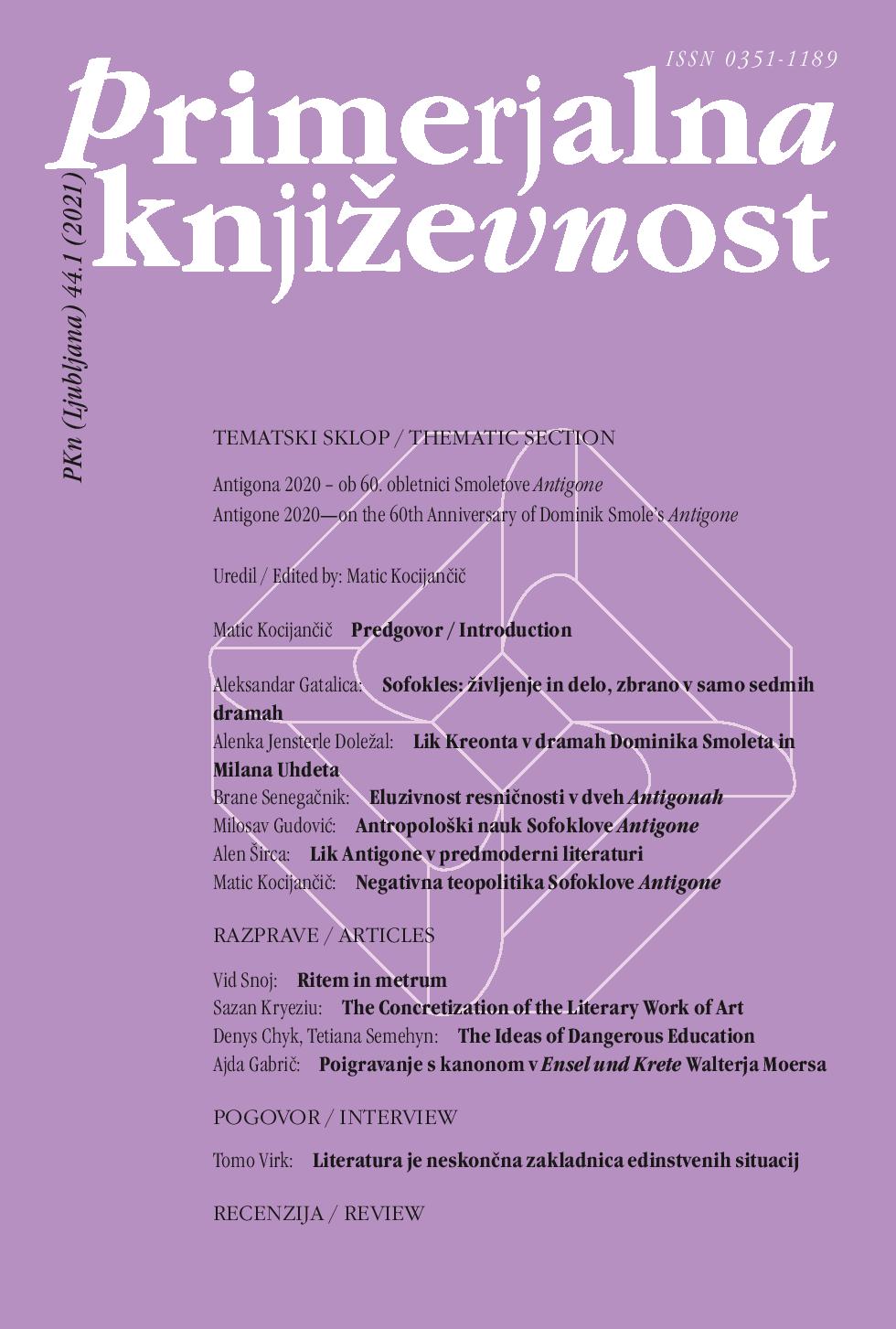“Nothing More Than Nothing”: The Negative Theopolitics of Sophocles’s Antigone
DOI:
https://doi.org/10.3986/pkn.v44.i1.06Keywords:
Greek tragedy, Sophocles: Antigone, philosophical interpretation, divine law, theopolitics, negative politicsAbstract
This article deals with the ending of Sophocles’s Antigone, the ingenious portrayal of Creon’s breakdown, remorse and withdrawal, which is too often overlooked in modern interpretations of this fundamental work of tragedy, focusing as they do above all on the central conflict between Antigone and Creon. A careful analysis of the concluding lines spoken by Creon and the Chorus, both in the original and in the rich tradition of Slovenian translations, and of their broader intellectual-historical context (particularly the Attic understanding of the relationship between divine and state law), reveals a challenging theopolitical point that traces the horizon of meaning of Sophocles’s entire work. In connection with this finding, the article develops the concept of negative politics, which provides a framework for understanding the two antagonistic theopolitical paradigms in Antigone and how the particular dynamics of the clash between them also foreshadows some recognizable spiritual and social upheavals of modernity.
References
Agamben, Giorgio. <em>Altissima povertà</em>. Vicenza: Neri Pozza Editore, 2011.
Ajshil. <em>Sedmerica proti Tebam</em>. Prev. Alojz Rebula. Maribor: Študentska založba Litera, 2005.
Anouilh, Jean. <em>Antigona</em>. Prev. Aleš Berger. Ljubljana: Slovenska matica, 2019.
Cairns, Douglas. <em>Sophocles: Antigone</em>. London: Bloomsbury, 2016.
Carson, Anne. <em>Antigonick (Sophocles)</em>. New York: New Directions, 2015.
Fraisse, Simone. <em>Le mythe d’Antigone</em>. Pariz: Armand Colin, 1974.
Goheen, Robert Francis. <em>The Imagery of Sophocles’ Antigone</em>. Princeton: Princeton University Press, 1951.
Gudović, Milosav. »Martin Heidegger in bistvo tragedije«. <em>Primerjalna književnost</em> 36.3 (2013): 19–40.
Harris, Edward M. <em>Democracy and the Rule of Law in Classical Athens</em>. New York: Cambridge University Press, 2006.
Hecht, Anthony, in Helen H. Bacon. »Notes on the Text«. <em>Seven Against Thebes</em>. Aeschylus, prev. Anthony Hecht in Helen H. Bacon. New York: Oxford University Press, 1973.
Hribar, Tine. »Antigona«. <em>Nova revija</em> 45 (1986): 64–106.
Jebb, Richard C. <em>Sophocles: The Plays and Fragments, Volume 3: The Antigone</em>. New York: Cambridge University Press, 2010.
Jensterle-Doležal, Alenka. <em>Mit o Antigoni v zahodno- in južnoslovanskih dramatikah sredi 20. stoletja</em>. Ljubljana: Slovenska matica, 2004.
Kaufmann, Walter. <em>Tragedy and Philosophy</em>. Princeton: Princeton University Press, 1992.
Knox, Bernard M. W. <em>The Heroic Temper: Studies in Sophoclean Tragedy</em>. Berkeley: University of California Press, 1983.
Lardinois, André. »Antigone«. <em>A Companion to Sophocles</em>. Ur. Kirk Ormand. Oxford: Wiley-Blackwell, 2012. 55–68.
Lewis, R. G. »An Alternative Date for Sophocles’ Antigone«. <em>Greek, Roman and Byzantine Studies</em> 29.1 (1988): 35–50.
Lima, Paulo Alexandre. »Religious Conflict in Sophocles’ Antigone«. <em>Cultura: Revista de História e Teoria das Ideias</em> 35 (2016): 267–287.
Oudemans, Th. C. W., in André Lardinois. »Existing Interpretations of Sophocles’ Antigone«. <em>Tragic Ambiguity: Anthropology, Philosophy and Sophocles’ Antigone</em>. Ur. Th. C. W. Oudemans in André Lardinois. Leiden: Brill, 1987. 107–117.
Pritchett, W. Kendrick. »Burial of the Greek War Dead«. <em>The Greek State at War, Part IV</em>. Ur. Pritchett, W. Kendrick. Berkeley: University of California Press, 1985. 94–97.
Schweizer, Harold. <em>Suffering and the Remedy of Art</em>. Albany: State University of New York Press, 1997.
Smole, Dominik. <em>Zbrano delo, 2. knjiga. Dramski spisi I: Antigona</em>. Ljubljana: Založba ZRC, 2009.
Sophocles. <em>Vol 1: Oedipus the King. Oedipus at Colonus. Antigone</em>. Prev. Francis Storr. London: William Heinemann, 1912 (Loeb 20).
Sourvinou-Inwood, Christiane. »Assumptions and the Creation of Meaning: Reading Sophocles’ <em>Antigone</em>«. <em>Journal of Hellenic Studies</em> 109 (1989): 134–148.
Steiner, George. <em>Antigones</em>. New Haven: Yale University Press, 1996.
Wilmer, S. E., in Audrone Zukauskaite, ur. <em>Interrogating Antigone in Postmodern Philosophy and Criticism</em>. Oxford: Oxford University Press, 2010.
Wilson, Emily. »Sophocles and Philosophy«. <em>Brill’s Companion to Sophocles</em>. Ur. Andreas Markantonatos. Leiden: Brill, 2012. 537–562.
Zimmermann, Christiane. <em>Der Antigone-Mythos in der antiken Literatur und Kunst</em>. Tübingen: Gunter Narr Verlag, 1993.
SLOVENSKI PREVODI SOFOKLOVE <em>ANTIGONE</em>
Sofoklej. <em>Edip Kralj – Antigona</em>. Prev. Fran Albrecht. Ljubljana: Slovenska matica, 1941.
Sofokles. <em>Antigona; Kralj Ojdipus</em>. Prev. Kajetan Gantar. Ljubljana: Mladinska knjiga, 1992.
Sofokles. <em>Antigone</em>. Prev. Ivan Hribovšek. Ljubljana: Družina, 2014.
Sofokles. <em>Kralj Oidipus; Oidipus v Kolonu; Antigona; Filoktetes</em>. Prev. Anton Sovrè. Ljubljana: Državna založba Slovenije, 1962.
Sophokles. <em>Antigone</em>. Prev. Cvetko Golar. Ljubljana: Zvezna tiskarna in knjigarna, 1924.


